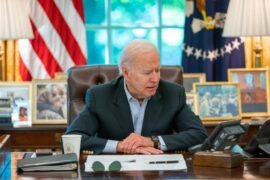Yisrael Beiteinu party leader Avigdor Lieberman presented his outline for a unity government last week, calling for a rotation in which Binyamin Netanyahu (Likud) would serve as prime minister first and then Benny Gantz (Blue & White) would hold the office next.
According to the the outline, only the Likud, Blue & White and Yisrael Beiteinu parties would initially be included in the government. Additional Knesset factions would be permitted to join the coalition only after basic guidelines and budgets are decided.
Lieberman’s proposal includes four steps. In the first, a joint team would be established for the three parties to decide the basic guidelines of the unity government.
In the second phase, after basic issues are agreed upon, Avigdor Lieberman demands the adoption of President Reuven Rivlin’s outline for the prime minister’s rotation.
The third stage would be the establishment of a unity government, comprised of the three parties, that would immediately work to approve both the 2020 state budget and a multi-annual plan for drafting ḥaredi men of military age into Israel’s army over the next decade.
The fourth stage would be to allow other Knesset factions into the coalition on the basis of the existing guidelines and budget.
Lieberman’s rhetoric has recently been primarily directed against Israel’s ḥaredi parties, who he calls to keep out of the coalition until such a time that they would have no meaningful influence over government policy. But his language has also been equally scathing against the Yamina party, specifically the National Union and Bayit Yehudi factions that last week separated from Ayelet Shaked’s more westernized HaYamin HeḤadash.
Avigdor Lieberman is a seasoned political operative who knows he’d have an easier time strengthening his position and broadening his appeal by targeting the ḥaredi political camp in his messaging. But that’s largely been a political smokescreen for his actual objective – a coalition without ideological nationalist parties committed to resisting partition.
The Yisrael Beiteinu leader has been clever enough to pair the ḥaredi parties with the national-religious factions ideologically opposed to dividing the country – the factions he’s likely been assigned by United States President Donald Trump to keep out of the coalition in order to ease Israel’s acceptance of the Trump plan.
What most Israelis have missed during the politically tumultuous last year is that Lieberman has been acting on behalf of the Trump administration and its imperialist interests in the region.
In late April 2018, Avigdor Lieberman traveled to Washington and returned with a test balloon for Trump’s plan to divide Israel into two separate states. The Yisrael Beiteinu leader, who was serving as Israel’s defense minister at the time, expressed support for the plan and urged Israelis to give it a chance.
“There is no free lunch,” the defense minister told Channel 2 in early May, following reports that he was shown parts of Trump’s plan and told that Israel would be forced to relinquish control over four Palestinian Jerusalem neighborhoods within the context of a two-state solution. At this point it should have become clear to the public that Lieberman had been recruited by the Trump team to drum up support for the initiative.
According to a report in the Hebrew-language Maariv newspaper at the time, the Trump plan also includes the internationalization of Jerusalem’s Old City.
Even earlier, in November 2016, immediately following Trump’s electoral victory, Avigdor Lieberman had already presented himself to be at the service of the new US administration by announcing support for a Jewish construction freeze in most of the West Bank.
Lieberman positioning himself to be Washington’s man on the ground is an interesting, yet not unexpected, turn of events. While his ability to fill that role has really only been made possible by the ascension of Donald Trump, the role itself has long existed in Israel’s political system.
Since the late 1970s, being the local representative of American empire in Israel’s political system has been a position carrying importance comparable with the prime ministers office – especially due to the fact that most Israelis have been conditioned by our media to view their survival as dependent on US support.
Throughout the 1980s and 90s, the role was given prestige by Shimon Peres. But following his ascension to Israel’s presidency in 2007, Peres essentially became what can be called “US asset emeritus” while Ehud Barak (who shared the role with Peres in the late 90s), Ehud Olmert and Tzipi Livni jockeyed for his position.
But now, with a neo-fascist US president in the White House cozying up to some of the world’s most reactionary political figures, Lieberman likely saw his opportunity to join the party through making himself useful to Trump’s Middle East team.
The Trump administration’s preference for a Netanyahu-Gantz “unity government” has been clear for some time and that’s exactly what Avigdor Lieberman has been pushing for to ease the acceptance of Washington’s regional agenda.
It should be within this context that we remember the fact that it was Lieberman’s resignation as defense minister last November that initially sent the country to early elections and it was his refusal to join a nationalist coalition with the Likud that ultimately forced Israel into an immediate second election cycle.
Despite Netanyahu’s public embrace of Trump’s policies, especially those that he could promote as his own diplomatic accomplishments, the nationalist government he formed following the 2015 elections wasn’t likely to accept the not-so-mysterious Trump plan.
The Trump plan has likely only been stalled so many times because it’s awaiting an Israeli coalition that would accept it without a fight and have the stability to last through the plan’s implementation. As the administration’s new man in Jerusalem, Lieberman couldn’t allow the formation of another nationalist government dependent on parties likely to resist Washington’s agenda. The new coalition would need to be free of ideological nationalists like Rav Rafi Peretz and Betzalel Smotrich, who would likely destabilize any coalition succumbing to US pressure to surrender territory.
Avigdor Lieberman has until now been able to function under the radar largely due to the political naïveté of Israel’s national camp and right-wing Diaspora Jews, who generally lack the consciousness or sophistication to understand Washington’s regional interests in the Middle East or how neo-imperialism actually works (not to mention the US-Israel relationship).
Ecstatic to finally feel they have a friend in the White House, the Jewish right has slavishly dismissed all evidence that the Trump plan will require major concessions from Israel. Being so enamored with the new administration’s ostensible pro-Israel policies, rightist Jews have adopted a policy of near complete denial whenever hints arise that Trump will demand an Israeli retreat from the cradle of Jewish civilization.
Since the failure of the “Orange resistance” to save Gush Katif from destruction in 2005, it’s been clear that Israel’s national camp is in desperate need of political sophistication. But with the likelihood of a Netanyahu-Gantz-Lieberman coalition looming and the Trump plan likely to drop on Israel as soon as such a government is formed, the need for such sophistication is looking increasingly necessary for an effective resistance to Washington’s two-state agenda.





